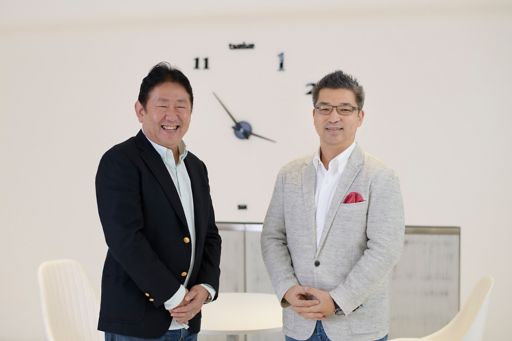In the world of business, the importance of SDGs and ESG has recently been advocated, with the word “sustainability” attracting significant attention. Meanwhile, as we all know, the word “digital transformation (DX)” is becoming a buzzword and the importance of DX at companies is increasing. As just described, we often hear the view that “sustainability” and “DX” will become the main strategic themes of companies in the post-COVID-19 world. However, there may not be so many people who realize that these two concepts are deeply interconnected.
Against this backdrop, Mitsubishi Chemical Holdings (hereafter referred to as Mitsubishi Chemical HD) is focusing on “ambidextrous DX”, which concurrently promotes DX for their current business issues and DX in anticipation of the future. It is also defining their management direction by focusing on “sustainability,” which includes seeking their ideal future 30 years from now while imagining society 50 years from now.
In this article, we will introduce a discussion between Masayuki Chatani from KPMG Ignition Tokyo and Naohiko Uramoto, Chief Digital Officer at Mitsubishi Chemical HD, who is playing a central role in promoting DX across the entire group. (Vol. 2)
There are Two Viewpoints regarding DX - Continuous DX and Disruptive DX
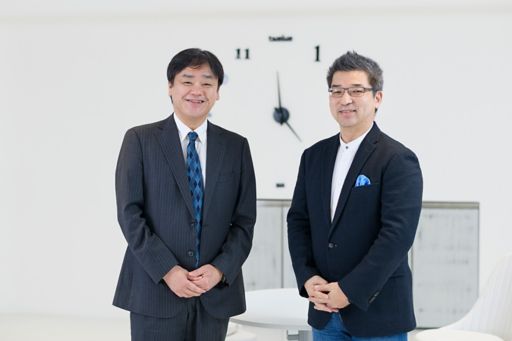
(Naohiko Uramoto, Executive Officer and Chief Digital Officer, Mitsubishi Chemical Holdings Corporation (left) and Masayuki Chatani, Representative Director & CEO of KPMG Ignition Tokyo and CDO of KPMG Japan) *Professional affiliation and official position in the article are at the time of publication.
Chatani: You said that “the life-cycle of products in the chemical industry is very long compared to those in the IT industry.” Listening to you, I feel that DX is steadily being promoted at worksites.
Uramoto: You’re right. Meanwhile, I have recently started to think that there may be two viewpoints regarding DX.
For instance, in a typical manufacturing business like ours, DX is viewed in terms of enhancing the sustainability of business, which means how we can streamline, advance and automate conventional processes such as the aforementioned detection of abnormalities at plants. I call this “continuous DX.” This does not involve a completely new business model or process but I am sure that it will bring extremely high value to companies.
The other is “disruptive DX,” which is the DX referred to by the public. This involves considering new businesses and changing the process itself. Uber and Amazon are introduced as examples. Corporate transformation such as “shifting from promoting tangible goods to intangible goods,” which is advocated in our document introducing the company vision and medium-term business plan, can be seen as disruptive DX. Materials informatics is also included here in the sense that it will significantly change the future of R & D.
Although we are selling synthesized products and medicines as “tangible goods,” I think that it will be necessary to change to a business model that can promote intangible goods and services sometime in the future.
Of course, this disruptive DX is important but continuous DX, which enhances sustainability, is also necessary for our company and so I think we must promote both of them. I personally call it “ambidextrous DX,” like “ambidextrous management,” but I think this way of thinking is very important.
Ability to Discern New Technology Based on Our Company Standard Is Indispensable for Promoting DX
Chatani: You mentioned the term “ambidextrous DX” but I assume that Mitsubishi Chemical HD is actively forming strategic partnerships with external companies. Are there any points you are giving consideration to when choosing partners?
Uramoto: One of the essences of DX, I think, is “speed.” When considering how we can promote DX projects with a sense of speed, we need to determine whether it is better to do it on our own or partner with a big company or with a start-up.
Therefore, when we partner with another company, we often choose our partner based on the standpoint of “which partnership will have the most sense of speed?” We are not particularly focusing on partnering with start-ups. We have a small self-manufacturing team, but rather our stance is that it is not necessarily good to have this team do everything. Sometimes we ask for the help of vendors and start-ups. We try to choose “the best option with a sense of speed” for each case by discerning what is best by ourselves.
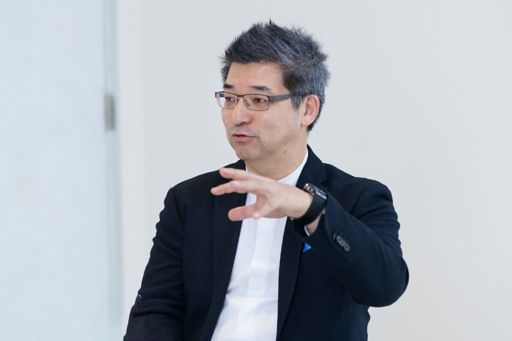
Chatani: Is there anything you pay attention to when you make the decision?
At KPMG Ignition Tokyo, we always say that “what people see differs between people with 5.0 vision and those with 1.0 vision.” For instance, a person with 5.0 vision will try to run away if there is a lion in the wilderness but a person with 1.0 vision will say “I see no lion” and doubt that “that person (with 5.0 vision) may be a liar” but will realize that he is at risk only when the lion eventually comes into view.
I think this can also be applied to the difference in the sensitivity toward the necessity for DX and in the depth of crisis each person feels. The viewpoint to decide whose story to listen to based on the knowledge that there is a “difference in vision” may even determine our future.
Uramoto: You’re absolutely right. The ability to discern is really difficult. That’s why, personally, I try to think that “even if I don’t know about something myself, I can believe what the person I believe in believes.” This is precisely why I contact Mr. Chatani once in a while (laughter). Even when I am unable to do something, I feel that I can rely on the activities of our team as well as various networks I have within and outside the company.
In addition, I also feel that extensive knowledge and the ability to determine “whether it is necessary for the company now” are very important. When I was working for IBM, I was involved in the promotion of blockchain for a few years. It was very interesting indeed but I believe that the viewpoint of “what kind of impact will blockchain technology have on a chemical company or a pharmaceutical company?” will also be necessary.
It is important to know what is being said in the world in general but it is also extremely important to contemplate what kind of meaning it will have for our company. We must also be aware that such views change over time.
As for blockchain, for instance, I would have thought three years ago that “it is not necessary to introduce the technology at a chemical company yet”. I also thought that there would be no problem that could not be solved unless it was a blockchain. However, now that social demands regarding recycling are increasing, technologies concerning traceability are becoming important for proving that “recycled materials are actually used” in manufacturing processes from raw materials to semi-manufactured and final products so that we can meet the requirement that “recycled materials must be included in materials.”
As blockchain technologies can satisfy such requirements, our decision will change to “the importance of blockchain technologies is increasing in the chemical industry.” We must continue to consider “what kind of impact this new technology will have on our company” according to the times and circumstances.
Connection Between Sustainability Management and DX
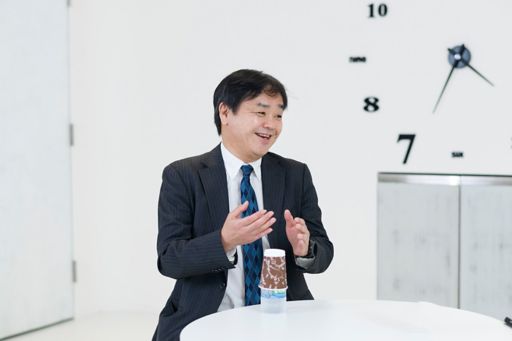
Chatani: What you just talked about, I think, is deeply connected with sustainability. As sustainability-related initiatives, indexes and materialities are introduced in detail on Mitsubishi Chemical HD’s website, we can see that you are focusing strongly on this area.
Uramoto: Mitsubishi Chemical HD is advocating “KAITEKI Management” and is implementing management methods based on three axes - “Management of Economics (MOE),” “Management of Technology (MOT)” and “Management of Sustainability (MOS).” Our DX activity is included in one of the indexes for MOT. Also, the MOS indexes are divided into three categories: a category related to the global environment (S), a category related to healthcare (H) and a category related to initiatives as a company with social trust (C). We are managing them by carrying out quantitative monitoring of the progress of each index with our own point calculation method. These initiatives are becoming issues not just in the chemical industry but for society as a whole.
Chatani: Are these sustainability-related activities connected with your DX promotion activities to some extent?
Uramoto: Yes, I think they will be important going forward.
As introduced earlier, what we started first are projects involving “continuous DX”, which deals with relatively close issues such as the stabilization of the plant’s production process, the detection of abnormalities and the optimization of the supply chain. We are also involved in “disruptive DX”. However, I feel that the time has come for us to utilize DX to focus on social issues including sustainability.
We do not have any actual project in progress but I feel that themes that can be or should be applied with DX are expanding. I also imagine that one of these themes will lead to the support of our sustainable management.
Chatani: I guess this means that data-driven and data-based decisions will be required to implement sustainability management.
Uramoto: That’s right. I think that should eventually be so and such initiatives are already being implemented. In the manufacturing industry, there is a movement called “Life Cycle Assessment (LCA).” This involves assessing environmental loads such as CO2 emissions during processes starting with the extraction of raw materials for a product and leading up to its disposal. As we need to carry out measurement and assessment based on data at times like this, this will indeed connected to data-driven management. In this sense, I guess there is an aspect of supporting sustainability with data.
Chatani: Is the foundation for carrying out such data-based management well advanced?
Uramoto: We are now at the stage where we are working hard to build the foundation.
Profile of Interviewee
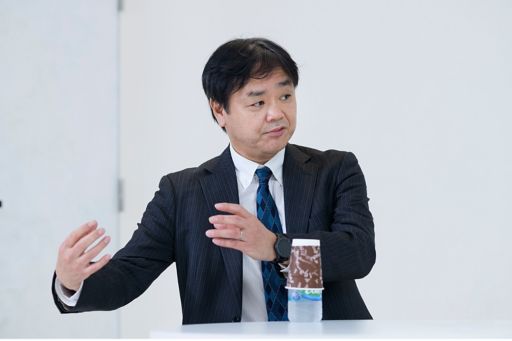
Naohiko Uramoto
Executive Officer and Chief Digital Officer
Mitsubishi Chemical Holdings Corporation
Naohiko Uramoto joined IBM Japan in 1990 and was engaged in the research and development of natural language processing, web technology, security and cloud computing, etc., at its Tokyo Research Laboratory. He served as CTO of Bluemix Garage Tokyo in 2016 and joined Mitsubishi Chemical Holdings in 2017. He is promoting digital transformation utilizing AI and IoT technology. In April 2020, he became Chief Digital Officer. In addition, he concurrently served as President of the Japanese Society for Artificial Intelligence from 2018 to June 2020 and now as a visiting professor at Kyushu University. He has been a fellow of the Information Processing Society of Japan since 2020.
Follow us on KPMG Ignition Tokyo LinkedIn for the latest news.
Connect with us
- Find office locations kpmg.findOfficeLocations
- kpmg.emailUs
- Social media @ KPMG kpmg.socialMedia



